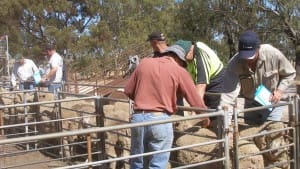Producers who manage half of Western Australia’s ewe flock are being targeted by organisers of the successful management program – Lifetime Ewe Management – in an effort to grow the state’s sheep numbers.
There are about 15 million sheep in WA flocks, including about eight million breeding ewes, and more than 400 producers have already completed LTEM training in WA.
Goal is 4 million ewes under LTEM management
But LTEM project development officer Jonathan England said the Department of Agriculture and Food-WA wanted to “ramp up” the number of producers with LTEM training.
“Our goal is to have around four million ewes, or 50 per cent of the State’s ewe flock, managed by producers who have completed this training program by 2018/19.”
Mr England said a recent national evaluation found the net annual gain of the productivity improvements as a result of LTEM participation was valued at $18,500 per farm (with 1500 ewes) after improvements in productivity and management costs were taken into account.
LTEM boosts productivity with management skills
Training under the LTEM program equips participants with best practice management principles for ewe management to increase on-farm productivity and profitability. Producers learn management and planning skills such as condition scoring sheep, assessing ewe nutritional needs and availability to prepare for joining and optimise ewe-lamb survival.
The training has been on offer previously but is undergoing a renewed push as part of the Sheep Industry Business Innovation project, made possible by Royalties for Regions funding and delivered by the Department of Agriculture and Food.
Flock growth plan linked to export marketing
Department director of sheep industry development Bruce Mullan said increasing the sheep flock was a key part of the overall project aim to grow the sheep industry and cultivate new export markets.
“With the increased demand from both domestic and overseas markets for sheep and sheepmeat, LTEM can rapidly increase the numbers of animals available,” he said.
More than half the cost of training is subsidised by Australian Wool Innovation and Royalties for Regions funding.
“The department and Rural Industries Skill Training are further adapting the package to best meet the latest needs of WA businesses, including enterprises where sheep are an important but not the main income source, and as a result may not be the main focus,” Mr England said.
“The program has been extended to two years involving six sessions, from its current single year format, reducing the yearly time commitment in a busy mixed farming schedule. It also allows a superior learning outcome with two years access to an experienced facilitator over the course of two seasons.”
For more information about the training, contact Mr England on 9881 0222, or to register a group of five producers contact RIST on (03) 5573 0943 or [email protected]
Source: DAFWA


Lifetime Ewe Management users should be aware that the research supporting LTEM was done only with Merino ewes and should not be extended to crossbred ewes, whose nutrient requirements are different. For instance, in a crossbred ewe flock, 50 percent of your ewes are likely to be single bearing and have no need to be condition score 3 at any stage of the yearly cycle. Of course it is nice to have them there, but it is unlikely to be profitable. Maximum productivity is seldom associated with maximum profitability.